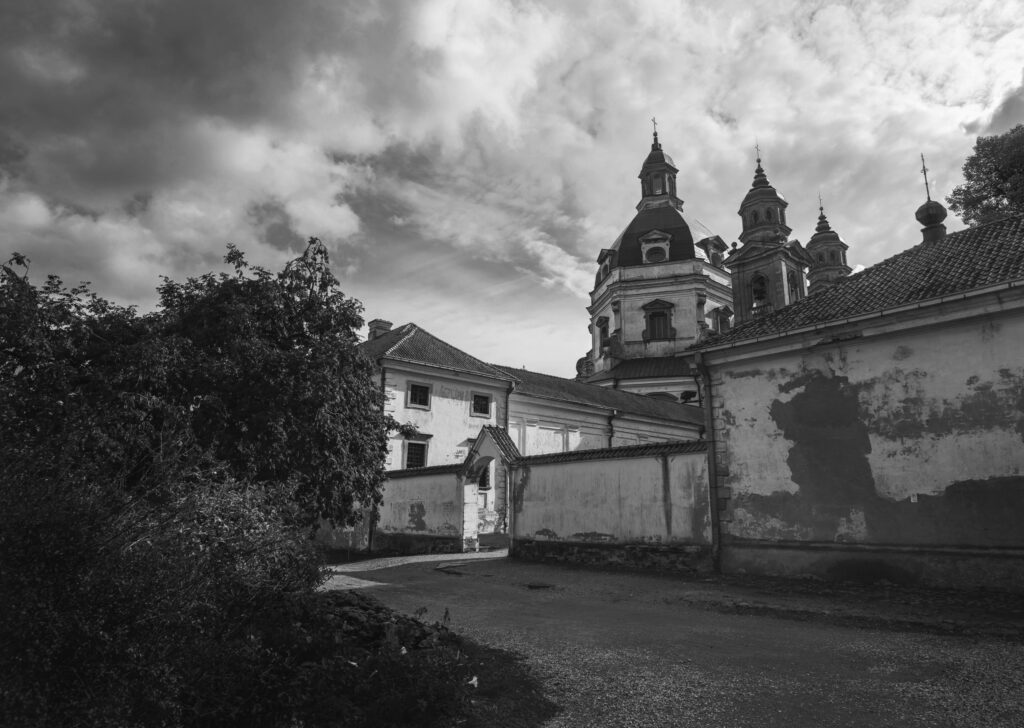In Some Unfinished Business, Antanas Sileika employs several effective strategies for creating suspense. He sets the stage for a momentous encounter between two people and resists revealing its purpose — connection? clarity? revenge? — for as long as possible. He repeatedly uses the title’s phrase, “some unfinished business,” the vagueness of which suggests anything from a casual task to an ominous mission. And he disrupts the linear telling of events by jumping back and forth between three distinct times and locations.
Written in straightforward, readable prose, the novel begins in 1959, in the Soviet Socialist Republic of Lithuania. An alcoholic poet is drying out at the Pažaislis Monastery Asylum. When a younger man slips into his cell, bottles of vodka in hand, the poet can’t place him. This doesn’t bother the newcomer, though. “I remember you all too well,” he says, his words charged with an import we can’t yet grasp.
From there, we move south to the rural village of Lyn Lake in 1947. Seven years earlier, the Soviets had occupied Lithuania. The Nazis came the following year. Three years after that, the Soviets returned. These successive occupations brought arrests, deportations, and mass murder, the latter predominantly of Lithuanian Jews.
In Lyn Lake, the Soviets exert their might through bureaucracy, surveillance, and brute force, while partisans carry out their resistance from the shadows of the forests. The villagers are caught in between, their every action or word at risk of being interpreted as a sign of cooperation with one side or the other. “It was best to do nothing, to say nothing, to keep your eyes on the ground and your mouth shut,” the narrator explains.

Set in Lithuania, the novel begins at Pažaislis Monastery Asylum, in 1959.
Carrigphotos Photography; Alamy
Nonetheless, Martin Averka has taken a side. A young teenager living with his parents and grandmother, Martin has secretly started to help the partisans, acting as their messenger and occasionally participating in their activities, like derailing a train. He looks up to the young men camped out in the woods and accepts that he will soon join their ranks.
One day, a new schoolteacher is appointed: a poet known for his writing for children. Hailing from the capital city, Vilnius, the urbane K. Kostas ushers in a more expansive vision of the world and its possibilities. He casually mentions that Martin might pursue engineering, for example, providing the boy with a different understanding of himself and his potential. Gradually, Kostas is welcomed by the partisans, having long conversations with their intellectually spirited leader, Badger, and contributing verse to their underground newspaper.
Then everything falls apart. Badger and another partisan are killed. Kostas disappears. Martin, just fifteen, is interrogated and sent to a labour camp in Siberia, where he spends the next eight years.
The rest of the novel reckons with these events. When Martin is released from the gulag in 1956, he heads to the Lithuanian capital, where he finds work, falls in love, and begins to build a small community. Yet reminders of the past intrude upon his hard‑won happiness. For instance, Kostas is also in town, frequenting the Writers’ Union nearby. Confronted with this central figure from the past, who is the key to understanding the circumstances that led to his friends’ murder and his own capture, Martin wonders if and how he should address his “unfinished business.”
In an afterword, Sileika explains the plot’s origin: a stranger wrote to him, detailing his family’s life in a village where a famed poet and teacher named Kostas Kubilinskas, a “Dr. Seuss of the Soviet Union,” turned out to have been a KGB agent. The resulting novel doesn’t hew completely to the historical record, nor does Sileika take inspiration only from the real Kostas. He also creates fictional versions of several other figures, including another poet and a local woman who both saved Jewish children from the Holocaust.
This ambitious attempt to weave together so many real and fictional lives isn’t entirely successful. Among Sileika’s characters are a street-smart orphan with entrepreneurial know‑how; a cartoonishly evil Soviet bureaucrat; a sympathetic member of the Communist Party, who is devoted to rescuing old books; and a prostitute whose hardened exterior belies a kind and compassionate soul. Martin and Kostas are more realized than the others, many of whom come across as archetypes. There is also something mechanical in the way the narrative unfolds at times, including a perfectly neat ending that feels better suited for Hollywood.
Even so, Some Unfinished Business largely resists easy answers. In addition to vividly portraying the everyday struggles of life under Soviet rule, it explores questions of complicity and innocence with nuance. Recalling his time in Lyn Lake, for example, Kostas describes Badger as a “Don Quixote tilting at the Kremlin.” Fighting against a totalitarian state may be the height of romantic delusion, however admirable, but most quests for justice are equally quixotic. What does it mean to seek justice anyway? What do we owe ourselves and others? Such questions animate a novel in which everyday life is fraught with peril, physical but also moral. People’s wills bend under state power and under suffering. For some, complicity becomes a path to survival. Martin recognizes this, saying, “There are no innocents. Only people who haven’t been tempted or tortured believe in innocence.” Still, he reflects, some are more guilty than others.
Marisa Grizenko is the reviews editor for Event magazine.

